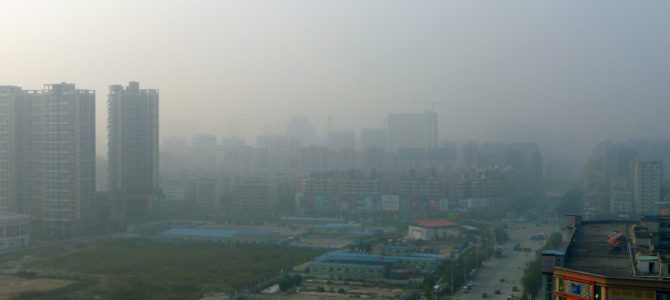
Bashing America is popular on the radical left, but it betrays just how much they really don’t know about the rest of the world. For leftists concerned about the environment, incessantly focusing on the United States is an especially big mental failure. While American stewardship of our land, water, and air have gradually improved over the last 50 years, real degradation of the natural environment has been increasing overseas.
Politicians on the left preach piously about the need to protect the Earth while decrying any sort of restriction on trade with the world’s greatest polluter, China. Anyone who cares about good stewardship of the Earth should consider that trade with China is the United States’ most anti-environmental activity. If you want to be green, you must call for tariffs on China.
Communism’s Anti-Environmental Legacy
China is by far the world’s biggest user of coal, and unlike the west, they make little attempt to clean up the byproducts. They burned more coal than ever in 2020 and so far in 2021, they are on pace to use even more. Pollution in their major cities, where mask-wearing was a thing long before anyone heard of COVID-19, is telling.
Their uncaring attitude even extends to space, like earlier this year when bits of a Chinese rocket were left to fall wherever they might. Even when China pretends to be green, the efforts are an obvious sham. The Chinese Communist Party cares as little for the Earth as they do its inhabitants.
The exact statistics from Beijing cannot be fully trusted, but their environmental record is in line with other Marxist regimes. As China does, the Soviet Union put a premium on rapid industrialization. While an advanced economy offers a better standard of living, the Soviets allowed a possibly worthy end to justify a host of atrocious means. In addition to executions, gulags, and famines, they also wrecked the environment, leaving behind a legacy of pollution Russia is still battling today.
China’s actions are similar. In their drive to rival the United States in economic output and industrial strength, they have committed atrocities against their own people and against the world. Mao Tse-Tung’s Great Leap Forward and its “backyard furnace” program are well-known examples. Instructing every communal farm to build a furnace to increase steel production, the CCP mainly succeeded in forcing farmers with no knowledge of steelmaking to melt down their iron and fuel forges by cutting down trees, only to result in inferior steel of no use to anyone.
China, Not the U.S., Needs Environmental Reform
The modern CCP is more sophisticated. They make products that, if not the highest quality, are good enough for mass export. By ignoring environmental concerns (and workplace safety concerns, labor law concerns, human rights concerns, etc.) they can produce a product so cheap the price overrides people’s other doubts.
Sacrificing people and resources for material gains is nothing new for a Marxist state, but our reaction to it is. In America, politicians on the left talk of the environment in increasingly apocalyptic terms. Climate change is a priority for very few voters, but the sky-is-falling rhetoric from their representatives would make you think nothing is of greater importance.
In summer 2019, the popular prophecy was that we had just 18 months to save the planet. Twenty-three months later, there is no word on whether we succeeded. But no matter, another fake deadline will be floated by the usual suspects and echoed by a credulous press.
With all of that urgency should come some action, but the only economy Democrats seem willing to weaken is our own. That’s odd, since American emissions of carbon dioxide and other greenhouse gases have been steadily declining for more than a decade, according to the Environmental Protection Agency. China — along with much of the developing world — is on the opposite trajectory. Based on actual data, the Green New Deal seems like something they, not we, should be pursuing.
But being soft on communism is as much as part of the Democrat Party’s DNA as radical environmentalism, so you won’t hear much criticism on that score. It looks like a flaw in their thinking, a mental blind spot that makes it much easier for the upper-class left to bash their own homeland than anyone else’s. But when you look harder, it’s really an example of striking cynicism.
Shackling our economy in green chains does not strongly affect the lives of most politicians or others like them who are far removed from the manufacturing sector. They can still get all the consumer products they desire, and possibly at a lower price — they just won’t be made here. They won’t be made in any place like America, either. They will be made in China.
Meanwhile, leftist politicians can talk big on green issues, rake in contributions from wealthy environmental activists, and pass laws that harm working people, but never feel the pain of all this. All their environmental agitation does is move pollution to another country.
Given the lack of regulation in China and elsewhere, this arguably makes for more worldwide pollution. And that’s before factoring in the costs of transporting everything halfway across the globe. Every hindrance on industry made in the name of the Earth is a lie if it does not include similar restrictions on imports from countries without laws like ours.
Conservatism’s Environmental Legacy
Republicans, on the other hand, are glad to be tough on China — befitting their party tradition of supporting a strong national defense, condemning communism, and projecting American power. But they and their conservative voters have often reacted to leftist environmental extremism by ignoring the issue altogether.
That leaves unrepresented a vast middle ground of voters who support reasonable conservation and stewardship of land, water, and air, but don’t want to shut down northern California’s farms to save the delta smelt. Roger Scruton noted this problem in his 2014 book, “How to Be a Conservative,” pointing out “the truth in environmentalism has been obscured by the agitated propaganda of the environmentalists and by the immensity of the problems that they put before us.”
As conservatism turns away from the unbridled globalism of multinational business interests, we should reexamine our relationship to the places we live. Bringing home jobs from China can serve our local communities in two ways: bringing steady employment, and doing so in a way that doesn’t destroy our natural environment.
Preserving our waterways so fish can live there. Conserving our forests for hunting, hiking, and camping. Thinking about the continuum of past, present, and future generations. Focusing on our homeplaces and keeping them clean. These are all sound conservative principles.
Scruton said “the truth in environmentalism is, then, the truth that rational beings externalize their costs when they lack the motive to act otherwise. The conservative response is to find the needed motive.” That is clearly the case for businesses who outsource to communist China. Real change, not mere rhetoric, requires us to realize trade with China is financially, spiritually, and environmentally detrimental.









